Myanmar coup: 'We were told to shoot protesters', say police who fled
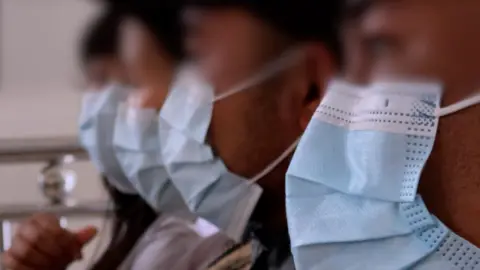 BBC
BBCPolice officers from Myanmar have told the BBC they fled across the border into India after refusing to carry out the orders of the military which seized power in a coup last month. In some of the first such interviews, more than a dozen defectors told us they escaped, fearing they'd be forced to kill or harm civilians.
"I was given orders to shoot at protesters. I told them I can't."
For nine years Naing - whose name we have changed for his safety - served as a policeman in Myanmar, also known as Burma.
Now, the 27-year-old is in hiding in the north-east Indian state of Mizoram.
I met him, and a group of policemen and women in their twenties, who say they ran away from their jobs back home, after refusing to carry out orders. "I was afraid that I would be forced to kill or harm innocent people who are protesting against the military," one officer said.
"We feel that it was wrong for the military to overthrow an elected government."
Ever since the Myanmar military, known as the Tatmadaw, seized power on 1 February, thousands of pro-democracy protesters have taken to the streets.
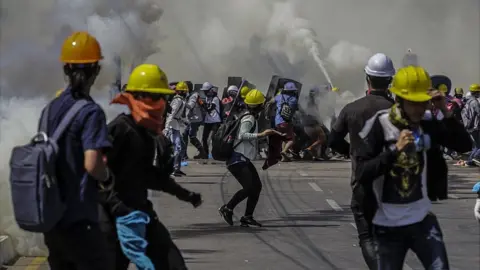 EPA
EPASecurity forces have been accused of killing more than 50 people.
Naing, who is a low-ranking officer from a town in the west of the country, says protests in his area began to escalate at the end of February.
He says he ran, after refusing twice to fire at demonstrators.
"I told my boss I couldn't do that, and that I was going to side with the people.
"The military is edgy. They are becoming more and more brutal."
As we speak, Naing pulls out his phone to show me photos of the family he left behind - a wife, and two daughters aged just five and six months.
"I am worried that it may not be possible to meet them again," he told me.
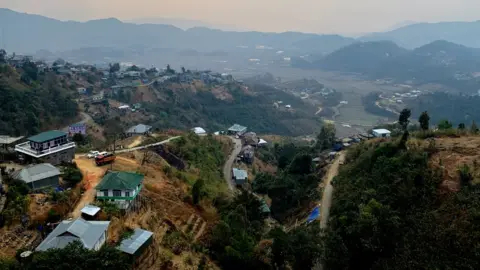
I met him and the rest of the group in an undisclosed location, overlooking the hills and valleys of the mountainous state of Mizoram, their home country of Myanmar less than 10 miles (16km) away from where we were chatting.
The officers we spoke to are among the first defectors to share eyewitness accounts of what they say is happening inside the country.
They say they're part of a growing number of officials who are joining the pro-democracy, civil disobedience movement (CDM) in the country.
The BBC was unable to independently verify any of the claims made by the police who spoke to us.
The UN, the US and a host of other countries have condemned the killing of civilians in the crackdown against anti-coup protesters in Myanmar, and called on the authorities to exercise restraint. The military has dismissed criticism of its actions and said it is ready to withstand sanctions and isolation after it seized power.
According to local officials, more than 100 people have escaped from Myanmar to Mizoram since the military coup.
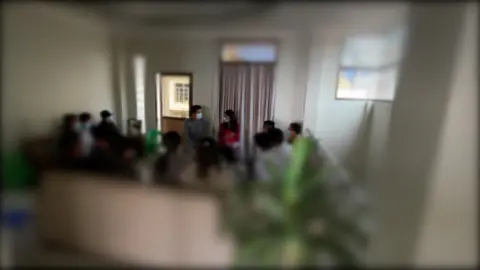
Htut - not his real name - recalls the night the military junta overthrew the government, after the internet was shut down and an army post was erected close to his station.
"A few hours later we learned the military had staged a coup."
Htut, who is 22, says he and other police were paired with members of the military as they patrolled the streets. Protesters who were peacefully banging utensils in support of the pro-democracy movement were threatened with arrest.
Htut, who is from a large city in Myanmar, says he too was asked to fire at protesters, a demand he refused.
"The military officer in charge ordered us to shoot people coming out in groups of more than five. I know that people were beaten up. I had sleepless nights.
"When I saw innocent people bleeding, my conscience wouldn't permit me to take part in such evil acts."
Htut says he was the only one from his police station to flee, making the journey by motorbike. He says he was terrified as he passed from village to village to reach the border with India.
Those we spoke to crossed into India over the Tiau river, which we visited. The 250-mile stretch of river forms part of the boundary between India and Myanmar.
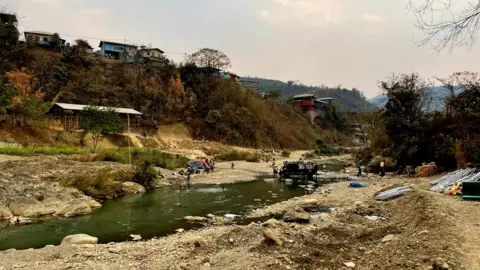
Groups we've spoken to say they expect more police to make this journey to India in the coming days.
Grace, whose name we have changed, is one of two female police officers we met who has defected.
She said she saw the military use sticks and rubber bullets to round up protesters, and on one occasion tear gas being fired into a group which included children.
"They wanted us to disperse the crowds, and arrest our friends, but we couldn't do it," she said.
"We love the police, but now the system has changed, we can't continue our job."
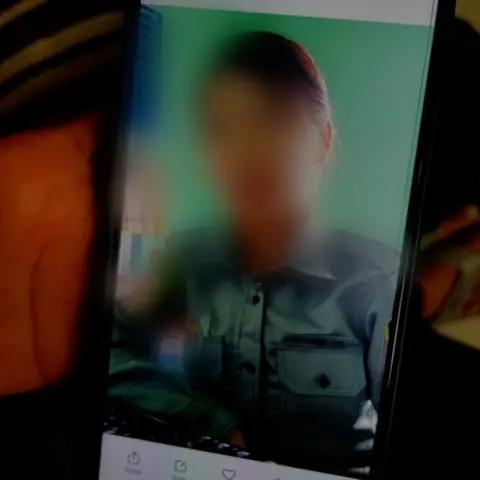

The 24-year-old says she also wrestled with leaving her family back home, in particular her mother who has a serious heart condition.
"My parents are old, and they're also afraid. But we young people have no choice but to flee and leave them behind."
Authorities in Myanmar have asked India to return any defectors, to "uphold friendly relations".
Mizoram Chief Minister Zoramthanga said those who have arrived should be given temporary shelter, while the national government decides what to do next.
Local groups have told us they expect many more defectors to make the journey to India in the coming days.
It's just not police officers who have fled. We met a shopkeeper who escaped to Mizoram, after authorities in Myanmar issued him with a warrant for rallying supporters online to join the pro-democracy movement.
"I'm not running away selfishly," he said, explaining why he risked it all to leave.
"Everyone inside the country is worried.
"I'm here for safety, and will continue to do what I can to support the movement, from this side."

Myanmar in profile
- Myanmar, also known as Burma, became independent from Britain in 1948. For much of its modern history it has been under military rule
- Restrictions began loosening from 2010 onwards, leading to free elections in 2015 and the installation of a government led by veteran opposition leader Aung San Suu Kyi the following year
- In 2017, Myanmar's army responded to attacks on police by Rohingya militants with a deadly crackdown, driving more than half a million Rohingya Muslims across the border into Bangladesh in what the UN later called a "textbook example of ethnic cleansing"

Additional reporting: Aakriti Thapar, Sanjay Ganguly, HC Vanlalruata
Follow Rajini on Twitter - @BBCRajiniV
